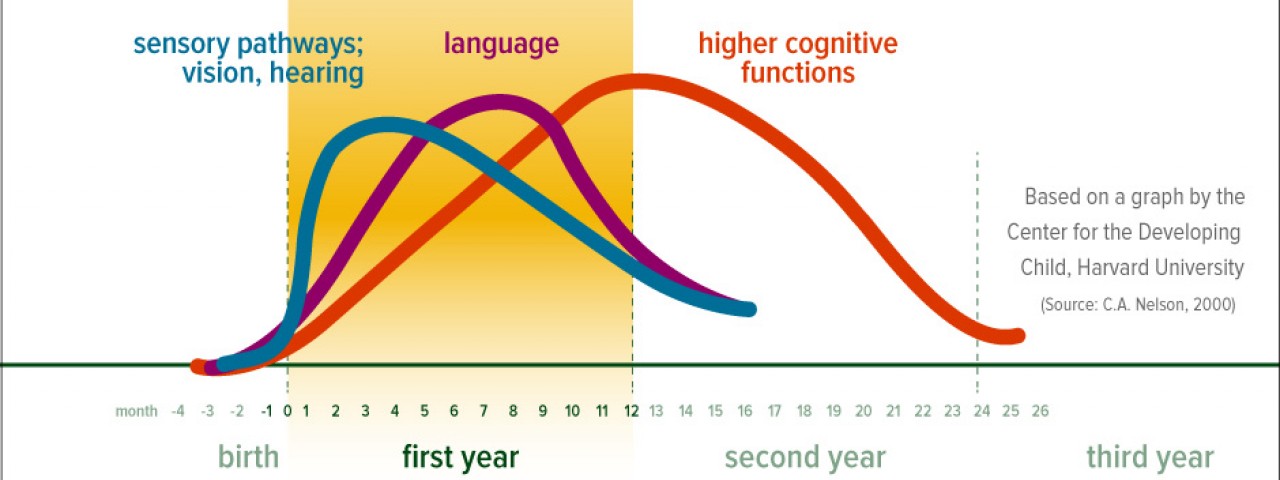Are You Listening? Hearing Development is Important!
- Tweet

No wonder infants have low tolerance for frustration: their capacity to communicate their wants and needs is virtually non-existent. Fortunately, for most young children, this frustration quickly disappears as they learn to interpret the facial expressions and the associated sounds made by the people in their lives. This growing capacity to communicate, in turn, influences just about all of our other developmental processes.
But what happens to infants with hearing impairments? The answer depends on their earliest environment of relationships. If these young children have deaf parents or hearing parents who use sign language, their language develops normally. If, however, parents insist that their children only learn an oral language, they have difficulty developing language to communicate.1
When other parts of their environment are rich with stimuli, these children’s earliest language development is comparable to hearing children, and deaf children whose parents encourage signing. At first, these children create their own home sign; they spontaneously give meaning to gestures they make to communicate (similar to the language of hearing children in the first year). Even without adult signers, at around 24 months, these children begin to put 2 or 3 home sign words together, just like hearing children do with spoken words. Unfortunately, their development ceases at this point. Without interventions from adults, these children can have considerable developmental delays.1
So what can hearing parents do for their children with hearing impairments?
- Screen your baby’s hearing early. When caught early parents can help their children learn through different methods. Give your children the best shot to succeed! Make sure your child’s hearing is tested at the hospital and when you take him or her to the pediatrician. Also, know the signs of hearing loss and know where you can get professional help. If your child is found at risk of a hearing impairment during a hearing screening, arrange for a hearing evaluation with a pediatric audiologist as soon as the risk is found.
- Consider cochlear implants or hearing aids. A pediatrician may advise using a cochlear implant to help a child’s hearing situation. A cochlear implant, also known as a bionic ear, is a surgically implanted electronic device that provides a sense of sound to a person with hearing difficulties. A doctor may also recommend the use of hearing aids in children. In the state of Tennessee, a child can receive an initial hearing aid free of charge and a new one every three years up to age 18 thanks to the Tennessee House’s vote last April.
- Learn sign language. You need to be able to communicate with your child so that you can build a strong bond and so you can help him or her learn. Learning a new language is difficult, but the Deaf Family Literacy Academy is here to help! They have trained mentors who go to your home and:
- Teach parents American Sign Language skills.
- Teach parents how to read to their child using ASL.
- Share reading time between parents and children.
- Teach deaf and hard of hearing children through ASL activities; preparing children to achieve in school.
- Promote Parent and Child Together Time, reinforcing families learning together and bonding activities.
- Get connected! All parents need support from others who are working through similar struggles. This is no less true for hearing parents who have deaf children. Memphis and Shelby County have great organizations to help you
All parents need to protect & promote their children’s hearing!
Over the lifetime, some hearing loss is inevitable because we get exposed to very loud noises, which damage our hearing. There are some loud noises we cannot avoid, but most of the time we can protect ourselves and our young children from loud, damaging noises. The hearing of babies and young children can be harmed more from a loud sound because babies are born with thinner skulls. It’s important for parents to protect their children.2
- Avoid listening to loud music around your babies: at home, in the car, or while celebrating with friends and family. Play it softly and you can enjoy it together.
- Don’t bring babies around very loud, harsh noise like fireworks, guns, power tools, and noisy vehicles.
- Even some sporting events or concerts can be too loud for your young children. But the free concerts at Levitt Shell are perfect for young children.
An adult can choose to increase their risk hearing damage, but young children have to rely on the adults around them to consider what is best for them. Whenever possible, avoid exposing young children to loud noises because the damage lasts all of their life.2
The most important thing parents can do to foster their children’s hearing is talking softly to their infants as often as possible: while you play, when you give your baby a bath and feed your baby, even when you change diapers. For tips to stimulate your children’s hearing development (along with the other four senses), click here.
References:Cole, M., & Packer, M. (2011). Culture in development. In M. E. Lamb, & M. H. Bornstein (Eds.), Social and personality development: An advanced textbook (pp. 67-123). New York: Psychology Press.
